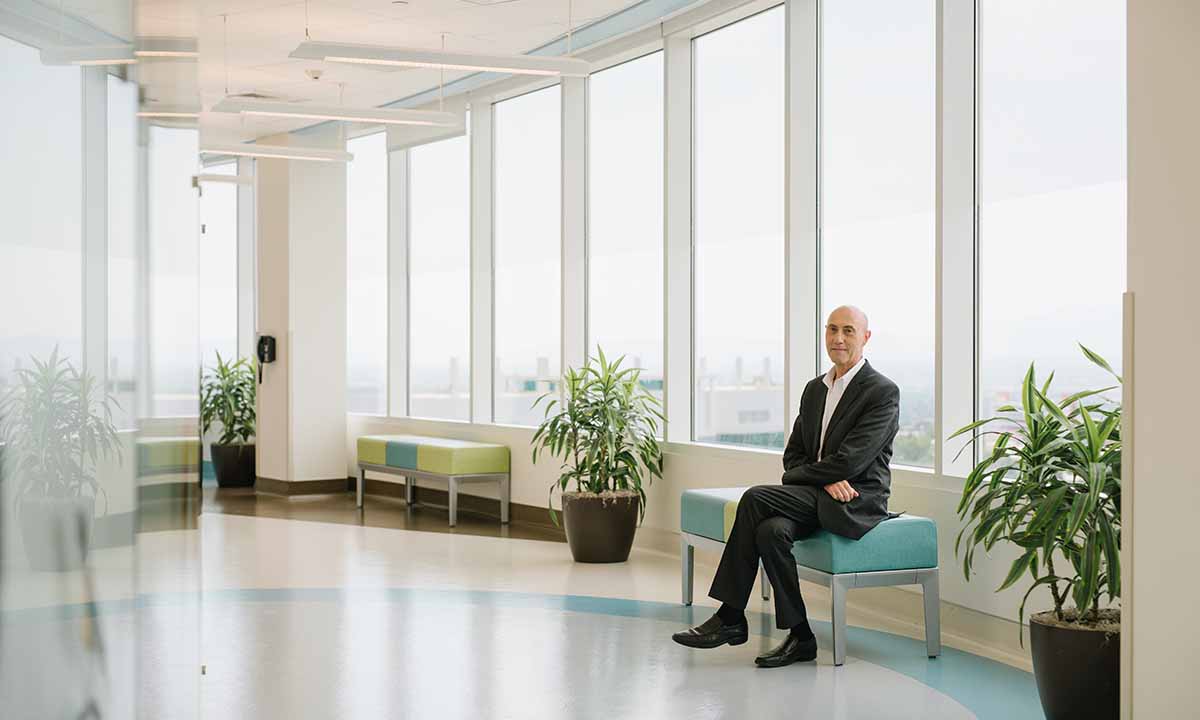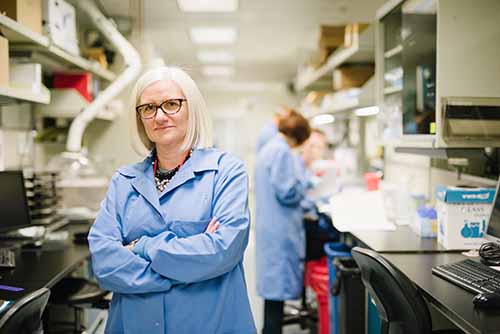
Nicola Longo, MD, PhD, has spent more than 20 years at University of Utah Health and ARUP Laboratories treating patients in his clinic and working with wife Marzia Pasquali, PhD, FACMG, to advance the diagnosis of inherited metabolic disorders.
If you have had a child in Utah since 2015, or an increasing number of other states more recently, your child has benefitted from the tireless work of Nicola Longo, MD, PhD, and his wife, Marzia Pasquali, PhD, FACMG.
Through sheer force of will and determination, the pair of biochemical geneticists persevered to have screening for guanidinoacetate methyltransferase (GAMT) deficiency included in newborn screening panels in Utah, New York, and Michigan, and to have the test added to the Recommended Uniform Screening Panel (RUSP) curated by the Advisory Committee on Heritable Disorders in Newborns and Children (ACHDNC). The addition of the test to the RUSP means more states are likely to add GAMT deficiency screening to their newborn panels.
As a result, more children with the rare inherited disorder that affects the body’s ability to produce creatine will be identified at birth and treated with supplements and a special diet so that they won’t develop cognitive impairments that characterize GAMT deficiency if it’s not discovered in infancy.
Longo, who will depart ARUP and University of Utah Health early this summer for a new role at the University of California, Los Angeles (UCLA), considers wider screening for GAMT deficiency one of his and Pasquali’s key contributions. “We’re very proud to have been able to help these children and their families,” he said.
Heidi Wallis, a Utah mother with two children who have GAMT deficiency and have long been Longo’s patients, said he quietly collaborated with Pasquali on the development of the newborn screening test without ever telling her they were doing it.
“I didn't ask him to sacrifice his time and energy,” said Wallis, the executive director of the Association for Creatine Deficiencies, who has since worked closely with Longo and Pasquali to expand newborn screening for GAMT deficiency. “He just cared, and quietly did what he thought was right.”

Longo and Pasquali have worked closely with one another at the same three universities for their entire careers. Now, that will change as they travel to spend weekends with one another either in Salt Lake City or Los Angeles. Pasquali will remain the section chief of Biochemical Genetics at ARUP, and Longo, a pediatrician who has been chief of the Medical Genetics Division at U of U Health, in addition to his involvement with Biochemical Genetics at ARUP, will build a new medical genetics clinic at UCLA.
“It’s going to be different, but we also find this new challenge exciting,” Pasquali said.
Specializing in Biochemical Genetics
Longo and Pasquali both grew up in Parma, Italy, and first met as high school students. Early on, neither imagined that their paths would lead them to Utah, where they would work together to establish a metabolic disorders clinic at U of U Health and a Biochemical Genetics Laboratory at ARUP that would become nationally and internationally known for the fruitful collaboration that enabled Pasquali’s lab to develop and refine tests to address the specific needs of Longo’s patients.
Longo said he began medical school at the University of Parma intending to be a general practitioner “to care for people,” while Pasquali pursued chemistry. During the second year of his studies, though, Longo began working in a laboratory researching basic metabolic processes. An interest in what he was learning led him to pursue a doctorate degree in molecular biology after finishing medical school, which then led him to complete postdoctoral fellowships in medical genetics and biochemical genetics as well as a pediatric residency at Emory University in Atlanta starting in 1985.
Pasquali, who earned doctorate degrees from the University of Parma in pharmaceutical chemistry and pharmacy, accompanied Longo to Emory to complete a postdoctoral fellowship in analytical chemistry. Both ended up in a medical genetics laboratory for different reasons, Longo to learn more about inherited metabolic disorders, and Pasquali to establish analytical chemistry methods in the lab.
Longo said they initially intended to stay in the United States for only a year, but they kept extending their stay and spent 16 years at Emory before being lured to U of U Health and ARUP in 2001.
Once in Salt Lake City, Longo set about creating a clinic at U of U Health where all types of metabolic disorders could be diagnosed and treated, “and, for this, it was essential to work closely with a laboratory.”
The lab Pasquali built responded to the needs of medical and biochemical geneticists. “Together, we learned by looking at the patient, and seeing how the laboratory test needed to change depending on how the patient was doing,” he said. “This helped us manage the patient, but it also helped the lab understand how to improve the test.”
“We know that the situation we have had here is kind of unique, but it has been able to help everybody,” Longo said.
Recreating Success at UCLA
Longo said he will miss the ease of his collaboration with Pasquali, and, “I will miss ARUP very much.” In addition to offering an opportunity to take on a new challenge, the move to UCLA will help with a medical issue that will be easier to manage in a climate that is warmer than Utah’s.
“I would like to recreate at UCLA what I have created here in Utah,” he said.
Longo added that he understands and respects that Pasquali has commitments and goals that will keep her at ARUP, and he looks forward to hearing how her projects are faring and discussing them.
Pasquali and colleagues in her lab are working on a screening test for creatine transporter deficiency, another inherited metabolic disorder for which there is no treatment yet, but for which patients may benefit from earlier interventions and perhaps have a better outcome. “Certainly, it would also offer some peace of mind for parents who want to know what their child has.”
She also wants to expand the Biochemical Genetics Laboratory to add more tests for inherited metabolic disorders, and she continues to work with parent and advocacy groups for metabolic disorders.
“I am doing a lot and I love what I do,” she said.
Collaboration Lives On
Longo and Pasquali said they adopted a basic philosophy years ago that has worked well for them, and they believe it has also been adopted by the many people they have trained who will carry on their work.
“We respect each other and each other’s expertise. We sit at the table as equals. We exchange ideas and we learn from each other,” Pasquali said. “Together, and with our colleagues, when we build a new test, everybody participates, and everybody brings something helpful, from a different perspective. That’s how you build a good product.”
She and Longo do not doubt that this philosophy will continue to thrive under Brian Shayota, MD, MPH, the new director of the metabolic clinic, whom Longo mentored.
“It’s ingrained in our system now, that we work together and it’s in everyone’s favor,” Shayota said. “As a metabolic geneticist, it is important to be able to communicate directly and work with people in the lab. Patient care is much easier because we are able to discuss cases rather than just receiving test results.”
He added that Longo leaves a remarkable legacy for the work he has done, not just in creatine deficiency disorders but also in fatty acid oxidation disorders.
“Patients travel from across the country to see him specifically,” Shayota said. “He’s an expert known across the globe by all biochemical geneticists.”
Wallis, the mother whose children have GAMT deficiency, said that she is “beyond sad” to lose Longo as her children’s clinician, but, “I’m happy for the families in the LA area who will have an amazing doctor now helping their children with creatine deficiencies.”
Lisa Carricaburu, lisa.carricaburu@aruplab.com
















